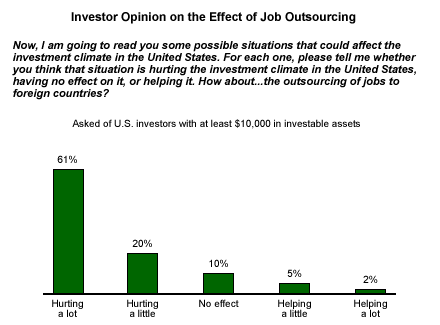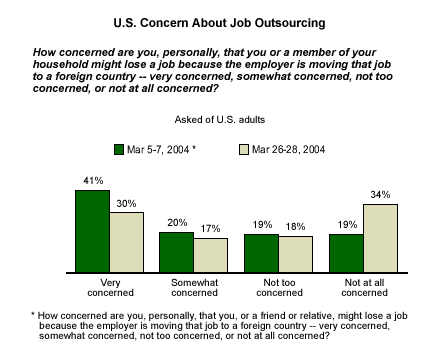The issue of outsourcing jobs has received extensive coverage in the media of late. Though it's been rather overhyped, outsourcing is an issue that deserves some attention. Approximately 2.7 million Americans have lost jobs in the recession of 2001 and its aftermath, as firms have tried to reduce their headcounts in a bid to improve earnings. While Wall Street is pleased with the results, fears about the migration of jobs overseas remain.
How many of these job losses can be accounted for by outsourcing? According to estimates by Forrester Research, of the 2.7 million jobs lost in the last three years, 300,000 were due to outsourcing -- a little over 11%. This number pales in comparison to projections for the future -- the McKinsey Global Institute has reported that the number of jobs outsourced could grow by 30% to 40% annually over the next five years.
How do Americans view this phenomenon? Gallup surveyed both the general public and U.S. investors on the subject in March, and found significant concern about outsourcing.
The Investor View: Outsourcing Hurting the Economy
As a part of the March Gallup/UBS Index of Investor Optimism survey*, investors (investors with at least $10,000 or more in investable assets) were asked to what extent a series of situations are affecting the investment climate. A majority (61%) of investors believe that "outsourcing of jobs to foreign countries" is "hurting the investment climate a lot."

Investors' views of outsourcing are overwhelmingly negative, but the implications of outsourcing for the stocks they invest in may be otherwise. To the extent that outsourcing helps companies pare down their cost structures, it can benefit investors by producing higher earnings and stock valuations. However, the survey suggests that this particular logic is something investors are either not aware of or not impressed with.
"Substantial" investors (investors with $100,000 or more in investable assets) are slightly less likely to express concern about outsourcing than their less affluent counterparts. Sixty-four percent of average investors (those with between $10,000 and $100,000 in investable assets) feel that outsourcing is hurting the investment climate a lot, while 55% of substantial investors share the same view.

Closer to Home
Gallup's latest polling of the general public on the effects of outsourcing is no more comforting. According to a poll conducted in the last week of March**, 30% of Americans are "very concerned" that they or a member of their household might lose a job because of outsourcing initiatives by their employers, while an additional 17% are "somewhat concerned." Concern appears to increase as annual incomes decrease: Only 15% of Americans with annual household incomes of $75,000 or more are very concerned, compared with 45% of those with annual household incomes of less than $30,000.

Bottom Line
The bottom line is that outsourcing represents a structural change in the way business is being done worldwide -- and it is here to stay. It is rapidly evolving from a source of competitive advantage for businesses, to a prerequisite for businesses that want to remain competitive.
Economic policy is unlikely to go protectionist, so politicians need to raise the level of debate. They must speak to how our education system can be improved to produce more skilled workers who can compete with workers overseas. And they must encourage American firms and entrepreneurs to do what they have always done best: innovate.
*Results are based on telephone interviews with 803 investors, aged 18 and older, conducted March 1-14, 2004. For results based on the total sample of investors, one can say with 95% confidence that the margin of sampling error is ±4 percentage points.
**Results are based on telephone interviews with 1,001 national adults, aged 18 and older, conducted March 26-28, 2004. For results based on the total sample of national adults, one can say with 95% confidence that the margin of sampling error is ±3 percentage points.

